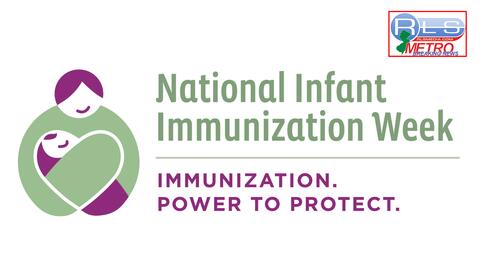TRENTON – During National Infant Immunization Week (NIIW) from April 24 to 30 this year, the New Jersey Department of Health (NJDOH) is joining other healthcare organizations in highlighting the importance of protecting infants and young children from vaccine-preventable diseases.
A primary focus of NIIW is ensuring children are up-to-date on their routinely recommended vaccinations, especially since some vaccines may have been missed during the COVID-19 pandemic.
“COVID-19 has caused many disruptions in families’ lives – and in some cases, it has meant that children have missed or delayed their wellness checkups and vaccinations, which are a critical part of ensuring children stay healthy,” said Health Commissioner Judith Persichilli.
“In addition to routine childhood vaccines, the Centers for Disease Control and Prevention (CDC) recommends everyone 5 years and older receive COVID-19 vaccination.
Getting your child vaccinated helps to protect your child and your family, including siblings who are not eligible for vaccination and family members who may be at risk of getting very sick if infected.”
NJDOH encourages providers, public health professionals, and individuals to participate in NIIW by talking about the importance of childhood immunization with families and through their websites and social media channels using the hashtag #ivax2protect.
The Department will continue to facilitate access to vaccines on behalf of residents and raise awareness about the importance of vaccinating children against serious diseases.
Protecting children through vaccination begins before birth. Pregnant women should receive the flu shot and Tdap (whooping cough) vaccines during each pregnancy. Pregnant women should get a dose of Tdap vaccine during the third trimester between 27 and 36 weeks, preferably during the earlier part of this period.
This will help protect babies from whooping cough until they can receive their first whooping cough vaccine at two months. People who are pregnant should also stay up to date with their COVID-19 vaccines, including getting a COVID-19 booster shot when recommended to get one.
Data show that completing a two-dose primary mRNA COVID-19 vaccine series during pregnancy can help protect babies younger than 6 months old from hospitalization due to COVID-19.
Most parents choose the safe, proven protection of vaccines. Giving babies the recommended vaccinations by age two is the best way to protect them from 14 serious childhood diseases, including whooping cough (pertussis) and measles.
Ensuring access to vaccinations is also an important part of maintaining the public’s health. Through the Vaccines for Children (VFC) program, NJDOH provides vaccines to partners to immunize uninsured and underinsured children according to the recommended immunization schedule.
Each year, the New Jersey VFC program provides about 1.6 million doses of vaccines to providers throughout the state.
This has contributed directly to a substantial increase in childhood immunization coverage levels and a reduction in disparities in vaccination coverage among young children.
Throughout the year, NJDOH promotes childhood immunization. One example is the Hot Shots for Tots Immunization Campaign, a voluntary point-based incentive program for child care and preschool facilities to help promote best practices for increasing childhood vaccination rates in NJ child care and preschools.
Currently in its fourth year, this program provides facilities with the opportunity to showcase their commitment to keeping kids healthy.
For additional information about NIIW and vaccine-preventable diseases, visit https://www.cdc.gov/vaccines/events/niiw/index.html and https://www.nj.gov/health/cd/vpdp.shtml.
Visit https://covid19.nj.gov/pages/finder to find COVID-19 vaccine locations near you.


